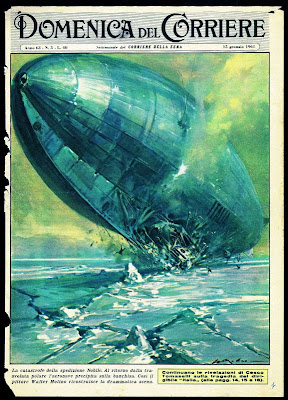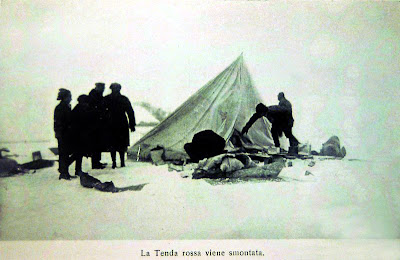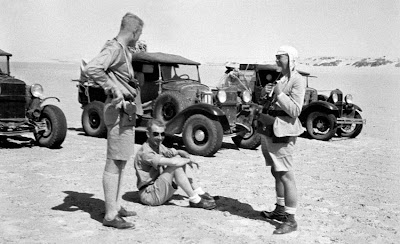
This is a rare story of Italy beating the world.
No, it's not to the title of Most Breast Obsessed Nation in Europe, which, to be honest, really belongs to us.
Nor is it for the Most Salacious Political Scandal of the Twenty First Century, a title which, despite strenuous efforts by Mr Berlusconi, still belongs to the bisexual ménage à trois/drink driving scandal that (literally) did for Austria's Neo-Nazi Jörg Haider.
No, it is that the Italian's can claim to have achieved one of the big three firsts in global exploration. It's a controversial claim, and the story ends in disaster and features monumental incompetence, so it's quite an appropriate achievement for the nation.
Italians haven't fared too well as explorers. Even many of their famous Alps were first climbed by plucky Brits. The expedition that should have been the pinnacle of Italian mountaineering, the 1865 ascent of the Matterhorn, was greeted just short the summit by a gaggle of English ex-Public School boys throwing snowballs and abuse. (Although the Italians, unlike the Alpine Club rowdies, made it down again in one piece).
However despite a slow start, it may actually have been the Italians who were first to the second of the earth's three poles. These being the North Pole, South Pole and the top of Everest.
It's a controversial claim because when I was a lad all the school textbooks had an Yank Admiral called Peary down as the chap who discovered the North Pole. Peary was an all-American type of bloke who led an all-American type of party. So typically all-American was it that they even had a black sailor called Henson go in front on foot to check for polar bears and crevasses whilst Peary rode on a sled.
Had the expedition actually been where it claimed to be a black American would have been the first person to set foot on the top of the world. Unfortunately it probably wasn't.
The case against is that neither Henson nor the Inuits that accompanied the party to the pole were navigators, so nobody was checking Peary's figures. Secondly Peary's average speed mysteriously doubles after he sent back the last fellow who could actually read a map. Finally there was the small point that rather than send his expedition report off to a panel of international experts for verification, such as the panel that had thrown out a claim by fellow American Frederick Cook the previous year, Peary had his claim upheld by the all-American National Geographic Society.
So although they didn't know it when they started out, the Italian expedition of 1928 under the leadership of Umberto Nobile was heading into terra incognita.
Now these Italians weren't planning on
walking to the pole, that would not be very Italian and would be far too much like hard work. Instead, they had a machine; the 105 metre long, 2250bhp airship
Italia.
Flying north one of the Swedish crew was able to drop off a letter to his mum as they flew over her house. They stopped off at Spitsbergen and then on 28th May 1928 headed for the pole. With a tail wind and the three German engines purring like finely tuned tigers, the
Italia reached the pole in only 19 hours.
Then it all started to go wrong.
Had they gone with the wind they could have been safely in North America and drinking Canada dry the next day. However they didn't want to risk an icy touch down in the frozen tundra, and so instead turned round and headed back to Norway.
They found themselves flying into the teeth of a gale. In order to find better weather Nobile let the craft rise too far, and the
Italia vented valuable hydrogen. Now too heavy to fly she dived into the pack ice. One man was killed in the crash, nine dumped onto the ice and six more were still trapped in the airship when she rose back into the air and were never seen again.

The survivors searched around to see what else had fallen out of the
Italia. They had some food, a tent, a gun, some charts and a radio. An aerial was improvised from the wreckage and an SOS message sent.
Now come the cock ups.
A ship, the
Citta di Milano, was waiting for the
Italia but when she didn't show up the Captain did nothing apart from send a telegram to Rome. They didn't even keep a thorough radio watch and missed the SOS messages. The Fascist government in Rome meanwhile weren't too keen on Nobile and didn't issue any orders to look for him.
Realising that they were probably on their own, three of the survivors then set of on foot to try to get help. One died (and was allegedly eaten, although there is a more heroic version of the story) whilst the other two walked on until they ran out of ice.
Fortunately, although their own government didn't seem to care about them, other people did, and soon aviators from all the nations bordering the arctic were milling about in an uncoordinated way trying to find them. One of the planes, carrying the Antarctic explorer Roald Amundsen, was lost, giving the first man to reach the South Pole a grave at the opposite end of the world.
After a month of searching the Swedish pilot Einar Lundborg sighted the survivors camp. He was only able to rescue one man, and he insisted it was Nobile. He went back to get another but crashed and found himself trapped on the ice as well.

Eventually it was a Russians who saved the day. The Icebreaker
Krasin rescued all the surviving survivors, who were busy holding the polar bears at bay with their one gun, and five downed rescuers as well for good measure.
Nobile returned to Italy where he was ostracised by Mussolini's government.
He and his crew outlived the Deuce though, and in 1945 he was forgiven and finally paid. He and what was left of his crew lived out long lives, unlike most of their rescuers who died of various causes. The officers of the
Krasin perishing in Stalin's purges.
Like Apollo 13, the rescue had rather overshadowed the voyage. At the time people still thought Peary had reached the pole and so it was not until 1989 that people started to consider the Italia's crew the first to reach the pole. That they didn't set foot on the top of the world doesn't really matter, as the polar ice moves anyway. If you wish to be pedantic about it the first people to set foot on the pole would be a group of Stalin's Russians who arrived by plane and about whom we know very little, which is a bit anti-climatic.
Instead I prefer the story of Nobile's disastrous expedition. So much more daring, so much more incompetent, so much more
Italian.















